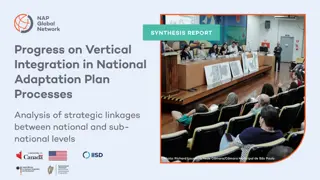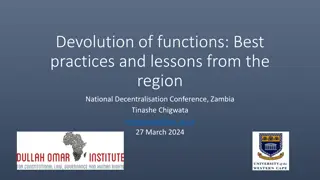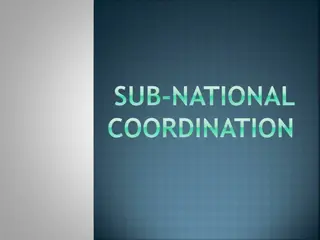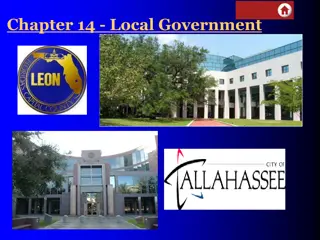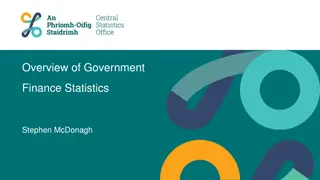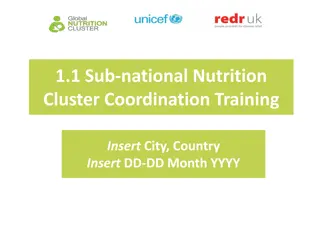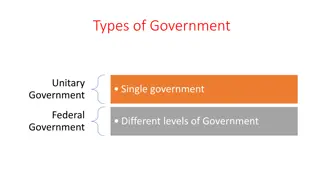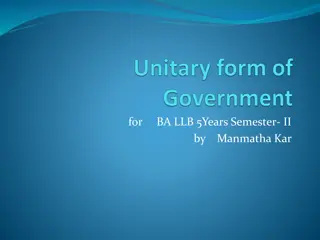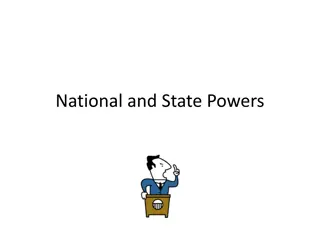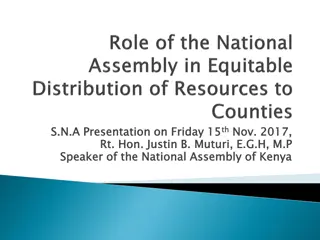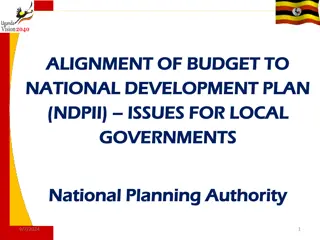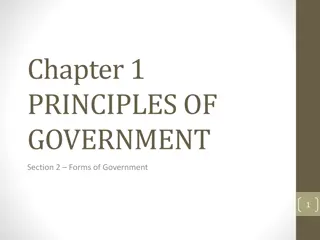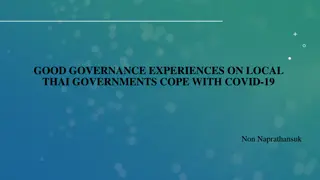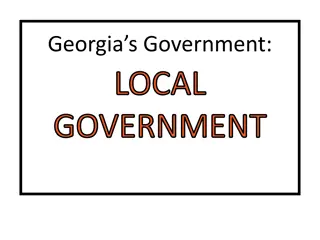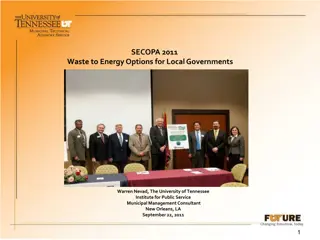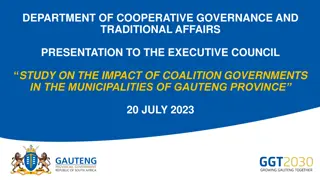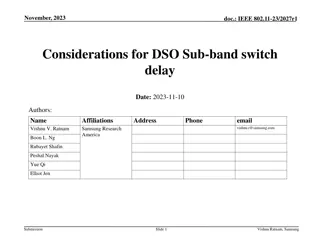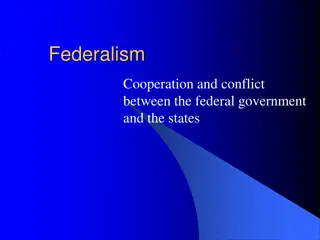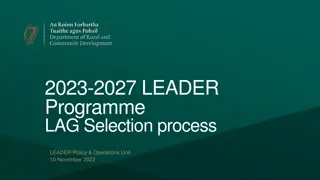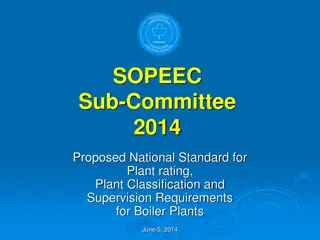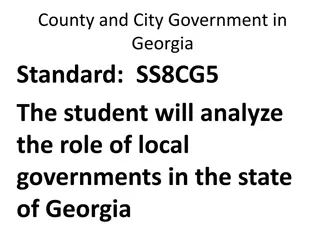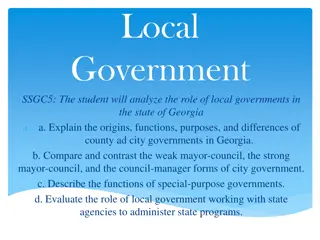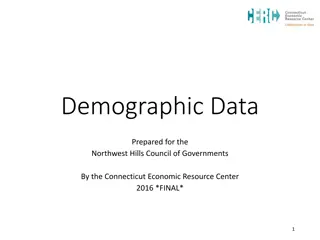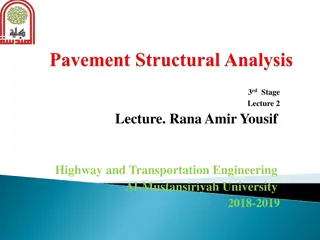Enhancing Youth Engagement for Sub-National SDG Reviews in Zimbabwe
Youth engagement in the Sustainable Development Goals (SDGs) is crucial in Zimbabwe as young people can bring fresh perspectives and drive innovation. To ensure robust sub-national SDG reviews, investment in youth capacity building, more decision-making opportunities, addressing specific youth needs
5 views • 14 slides
Vertical Integration in National Adaptation Plan (NAP) Processes: Insights and Best Practices
Explore the essential aspects of vertical integration in NAP processes, including entry points, enabling factors, roles of sub-national governments, involvement of non-governmental actors, community-based approaches, capacity building, and skill sets. Gain valuable insights from experts in the field
0 views • 10 slides
Tamil Nadu Uniformed Service Recruitment Board (TNUSRB)
Tamil Nadu Uniformed Service Recruitment Board (TNUSRB) \nTamil Nadu Uniformed Services Recruitment Board (TNUSRB) was established in 1991 by the Government of Tamil Nadu to recruit individuals for the state\u2019s uniformed services, which include the Police, Prison, and Fire and Rescue Services.\
6 views • 5 slides
Devolution of Functions: Best Practices in Subnational Governance
Understanding the importance of function assignment (FA) in subnational governance is crucial for effective decentralization. By learning from other countries and adopting a progressive FA framework, subnational governments can better achieve local, national, and sustainable development goals. The p
0 views • 14 slides
Understanding Sub-Letting in Rental Properties
Assured tenancies come with a statutory prohibition on sub-letting under the Housing Act 1988. If a tenant sub-lets, they breach their contract with the landlord, potentially leading to possession orders. The sub-tenants have a legal status, but the contractual relationship for paying rent lies with
0 views • 18 slides
Understanding Nutrition Cluster Structures and Coordination Roles
Explore the diverse structures and roles of actors within nutrition clusters at various levels, from global to sub-national. Learn about the responsibilities of key players such as Cluster Coordinators, Information Managers, and Technical Working Groups. Discover the government's role in the nutriti
3 views • 18 slides
Guidelines for Media Reporting on Gender-Based Violence: Roles and Functions of GBV Sub-Cluster
Comprehensive guidelines for media reporting on Gender-Based Violence (GBV) covering the roles and responsibilities of the GBV Sub-Cluster, the coordination structure, functions of the GBV Sub-Cluster, and basic concepts of GBV including different forms of violence. The document emphasizes the impor
2 views • 36 slides
Ensuring Quality in Legal Translation by 3 Parties: Governments, Courts, and Translators
Explore the importance of quality legal translation involving governments, courts, and translators in criminal proceedings. The European Union's Directive on interpretation and translation aims to facilitate communication across Member States. Governments play a key role in regulating the translatio
0 views • 20 slides
Sub-National Coordination: Benefits and Implementation
Sub-national coordination allows for decentralized decision-making, close cooperation with stakeholders, and increased community involvement. This approach ensures quick response times, adaptation to local circumstances, and enhanced accountability to affected populations. Learn about the roles, adv
0 views • 7 slides
Understanding Local Government: Powers, Responsibilities, and Organization
Local governments are established by state governments and provided powers through charters. They deliver essential services like road maintenance, water supply, and waste collection. Municipalities have self-government to serve their citizens. Ordinances, statutes, and acts regulate local laws and
3 views • 17 slides
Understanding Government Finance Statistics and National Accounts
Government Finance Statistics play a crucial role in understanding the financial activities of governments, covering revenue, expenditure, assets, and liabilities. Compiled according to legal EU standards, these statistics provide insights into the economic functions of governments. They are part of
3 views • 15 slides
Key Characteristics of Fungal Divisions and Sub-Divisions
Identification key for important characteristics of fungal divisions and sub-divisions, including Myxomycota and Eumycota, with detailed descriptions of sub-divisions such as Mastigomycotina, Zygomycotina, Ascomycotina, Basidiomycotina, and Deuteromycotina. Focus on distinguishing features, reproduc
0 views • 13 slides
Sub-national Nutrition Cluster Coordination Training Workshop
Welcome to the Sub-national Nutrition Cluster Coordination Training Workshop aimed at sharing key concepts, tools, and approaches for effective coordination of nutrition in emergencies. This training prepares participants for working in Nutrition Cluster/Sector Coordination, promoting dialogue and s
1 views • 10 slides
Understanding Fiscal Federalism and Decentralization in Government Systems
Fiscal federalism involves the allocation of responsibilities and resources between central and local governments, addressing key issues such as regulation, incentives for resource transfer, and financial balance. Fiscal decentralization, on the other hand, focuses on transferring taxing and spendin
0 views • 16 slides
Comparison of Unitary and Federal Government Systems
This presentation compares unitary and federal government systems, highlighting differences in the number of governments, constitution type, flexibility, division of powers, supremacy of constitution, judiciary independence, and legislative structure. It explains how unitary governments have a singl
0 views • 7 slides
Understanding the Nature and Scope of Comparative Politics
Comparative politics explores a wide range of political activities, going beyond national governments to include various institutions and organizations. It involves analyzing different forms of governments and institutions to identify similarities and differences in political behavior. The disciplin
0 views • 14 slides
Understanding National and State Powers in the United States
The Constitution grants specific powers to the national government, including expressed, implied, and inherent powers. States have reserved powers, and there are concurrent powers shared by both levels of government. The Supremacy Clause ensures that national laws take precedence over state laws. Ex
0 views • 13 slides
Devolution in Kenya: Empowering Local Governance
The promulgation of the Constitution in 2010 marked a significant shift in Kenya's administrative structures through devolution. This decentralization process aims to promote social-economic development, provide accessible services to all Kenyans, and ensure equitable sharing of resources between Na
0 views • 19 slides
Aligning Budget with National Development Plan for Local Governments in Uganda
Uganda aims to become an upper-middle-income country by 2040, focusing on improving the well-being of its citizens. The National Development Plan II targets achieving lower-middle-income status, emphasizing inclusive growth and socio-economic indicators at the household level. Managing for Developme
1 views • 20 slides
Reassessing Scholarly and Sub-Scientific Mathematical Cultures
Scholarly and sub-scientific mathematical cultures are reevaluated through the works of Jens Hoyrup, focusing on the organized nature of sub-scientific knowledge. The distinction between theoretical and practical knowledge, applications to mathematical cultures, and misconceptions related to the sup
0 views • 53 slides
Understanding Forms of Government Today
Different forms of government exist in the world today, classified based on characteristics like participation, power distribution, and branches of power. Democracies emphasize people's involvement, while dictatorships concentrate power. Governments can be unitary, federal, or confederate, and power
5 views • 17 slides
Analyzing Good Governance Experiences in Thai Local Governments Coping with COVID-19
This study examines how local Thai governments have applied good governance practices to manage the challenges posed by COVID-19. Utilizing a qualitative approach, the research focuses on strategies implemented at the provincial and sub-district levels in Thailand. The study assesses governance indi
0 views • 16 slides
Classification of Class Aves and its Sub-Classes
Class Aves is divided into two sub-classes based on characteristics like teeth, claws, and bone structure. The sub-classes are Archaeornithes and Neornithes, each with distinct features and orders. Archaeornithes include the extinct order Archaeopterigiforms, exhibiting reptilian and avian traits. N
0 views • 13 slides
Adolescent Fertility Trends in Sub-Saharan Africa: A Critical Analysis
Investigating adolescent fertility rates in Sub-Saharan Africa reveals disparities in existing measurements and raises questions about the relationship between adolescent birth rates, unmet needs for contraception, and gender equity. Utilizing data from Health and Demographic Surveillance Systems al
0 views • 21 slides
Overview of Local Governments in Georgia
Explore the structure and functions of local governments in Georgia, including counties and cities. Discover how counties serve as administrative subdivisions and provide essential services, while cities originated as trading hubs and offer unique services beyond county jurisdictions. Learn about th
0 views • 26 slides
Waste to Energy Options for Local Governments
Waste to Energy Options for Local Governments explores various technologies available for local governments to convert waste into energy sources such as biodiesel, green diesel, and ethanol. The presentation covers examples of projects, companies at the forefront, and the benefits including energy i
0 views • 14 slides
Study on the Impact of Coalition Governments in Gauteng Municipalities
The Department of Cooperative Governance and Traditional Affairs conducted a study on the impact of coalition governments in Gauteng municipalities. The study aims to understand the dynamics, challenges, and effects of coalition governments on governance, service delivery, and administration. With t
0 views • 60 slides
Improving Sub-Seasonal to Seasonal Prediction at NOAA
NOAA's efforts in improving sub-seasonal to seasonal predictions aim to enhance emergency management planning, health outcomes, national infrastructure decisions, and national security posture. Specific initiatives include the California Drought Service Assessment, operational product development, E
0 views • 13 slides
The Importance of Sub-Editing in Journalism
Sub-editing plays a crucial role in journalism by enhancing news stories for clarity, accuracy, and readability. Reporters provide the content, but sub-editors refine it to align with publication policies and style. Editing involves more than just fixing grammar and factual errors; it shapes the ess
0 views • 15 slides
Considerations for Dynamic Sub-band Operation Switch Delay in IEEE 802.11-23/2027r1
This document addresses issues related to sub-band switch delay in Dynamic Sub-band Operation (DSO) within IEEE 802.11-23/2027r1. It proposes strategies like no-ACK initial control frames and follow-up frames to manage channel reservations for DSO sub-band switches efficiently.
0 views • 14 slides
Understanding Federalism: Cooperation and Conflict Between Governments
Federalism entails the division and sharing of powers between national and state governments, aiming for cooperative problem-solving. James Madison highlighted the need for checks and balances to control government abuse. The Constitution delegates specific powers to the national government while al
0 views • 9 slides
Europe Sub-Orbital Testing Services Market Forecast & Opportunities
The Europe sub-orbital testing services market is estimated to reach $30.7 million by 2032 from $16.4 million in 2022, at a CAGR of 6.48% during the forecast period 2022-2032.\n\nRead Report Overview: \/\/bisresearch.com\/industry-report\/europe-sub-
1 views • 3 slides
Understanding LEADER Programme and Sub-Regional Areas in Ireland
LEADER Programme in Ireland is a key element of the Rural Development Policy 2021-2025, focusing on bottom-up, community-led approaches for rural development. It is delivered across 28 sub-regional areas, excluding main cities, through Local Action Groups implementing Local Development Strategies. S
0 views • 16 slides
Proposed National Standard for Plant Rating and Classification
The SOPEEC Sub-Committee in 2014 proposed a national standard for plant rating and classification for boiler plants in Canada. This initiative aims to establish uniform regulations for the safe management and operation of boilers, steam prime movers, compressors, and refrigeration technologies. The
0 views • 29 slides
Role of Local Governments in Georgia
Local governments in Georgia, including 159 counties and nearly 600 cities, play a vital role in providing services closest to the people. These governments derive their powers from the state constitution, with counties responsible for services like police, road maintenance, and public health. Count
0 views • 32 slides
Local Government Structure and Functions in Georgia
Local government in Georgia comprises county and city governments, each with distinct origins, functions, and roles. Counties serve as districts to implement state laws, with elected commissioners overseeing policies, ordinances, budgets, and services. Cities operate under different forms of governm
0 views • 18 slides
Demographic Trends in Northwest Hills Council of Governments Region
The demographic data prepared for the Northwest Hills Council of Governments shows the historical population growth in the region from 1960 to 2010, comparing it to the state and national trends. The data highlights a 44% increase in the region's population, with specific towns experiencing signific
0 views • 33 slides
Understanding Typical Layers of Flexible Pavement in Highway Engineering
The typical layers of a conventional flexible pavement include seal coat, surface course, tack coat, binder course, prime coat, base course, sub-base course, compacted sub-grade, and natural sub-grade. Each layer serves a specific purpose in providing strength, durability, and drainage characteristi
0 views • 9 slides
Sub-Orbital Testing Services Market
The global sub-orbital testing services market is estimated to reach $178.1 million in 2032 from $122.4 million in 2022, at a CAGR of 3.82% during the forecast period 2022-2032.\n\nRead Report Overview: \/\/bisresearch.com\/industry-report\/sub-orbit
1 views • 3 slides
Relativistic Heavy-Ion and Spin Physics Sub-group Mandate and Tasks
The Relativistic Heavy-Ion and Spin Physics Sub-group, part of the JINR Strategic Long-Range Plan, is tasked with identifying scientific priorities and research infrastructure to maintain JINR's global scientific leadership. Members include experts from various institutions collaborating to develop
0 views • 8 slides

